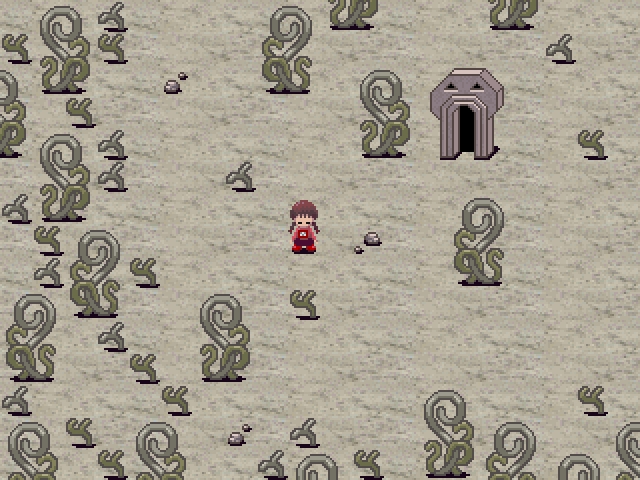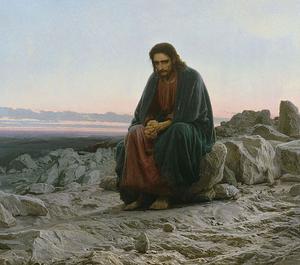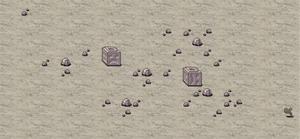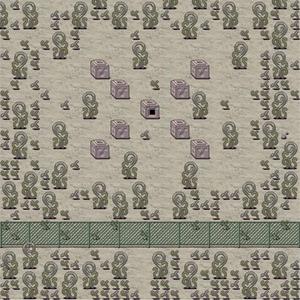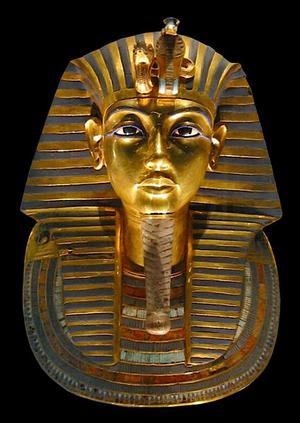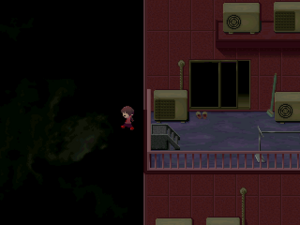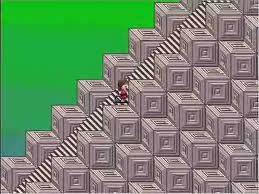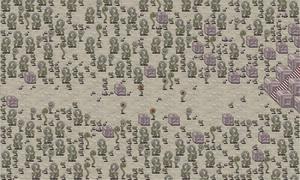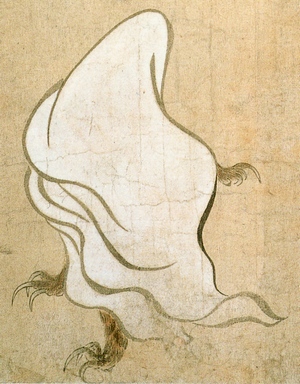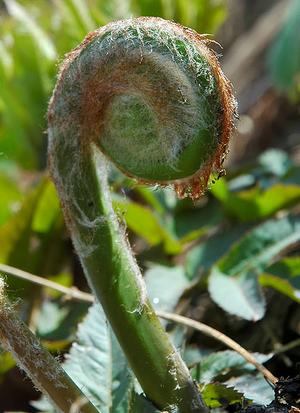The Wilderness(Temptation of Christ)
荒野の誘惑(あらののゆうわく)はキリスト教の聖書正典である新約聖書に書かれているエピソードの1つ。キリスト教教理において重要な役割を果たしており、キリスト教文化圏の芸術作品の中で繰り返し用いられるモチーフでもある。 The temptation of Christ is detailed in the Gospels of Matthew,[1] Mark,[2] and Luke.[3] According to these texts, after being baptized, Jesus fasted for forty days and nights in the Judaean Desert. During this time, the devil appeared to Jesus and tempted him. Jesus having refused each temptation, the devil departed and angels came and brought nourishment to Jesus.
洗礼者ヨハネから洗礼を受けた後、イエスは霊によって荒れ野に送り出され、そこに40日間留まり、悪魔(サタン)の誘惑を受けた。マルコによる福音書(1:12,13)、マタイによる福音書(4:1-11)、ルカによる福音書(4:1-13)の福音書に記述がある。以下は、マタイ伝とルカ伝によるもの。
The Wilderness(Book of Isaiah 8:14)
The Book of Isaiah (Hebrew: ספר ישעיה) is the first of the Latter Prophets in the Hebrew Bible, preceding Ezekiel, Jeremiah and the Book of the Twelve. (The order of the subsequent books differs somewhat in the Christian Old Testament).
主はイスラエルの二つの家には聖所となり、またさまたげの石、つまずきの岩となり、エルサレムの住民には網となり、わなとなる。
Rock and stone of hindrance, of stumbling,
to the inhabitants of Jerusalem will be net, he will be a snare to the main house of Israel are also two, become a sanctuary.
http://en.wikipedia.org/wiki/Book_of_Isaiah
The Wilderness(Stumbling block)
パウロによるキリストの福音 III (The gospel of Christ by Paul III)
第一三章 イスラエルのつまずき(9章30~10章21節)
Chapter I of the Third Israel stumble
(Section 21 Chapter 9 Chapter 30-10)
26 イスラエルのつまずき (9章30節~10章4節)
(Section 4 Section 10 Chapter 30 - Chapter 9) stumble Israel 26
30 では何と言おうか。義を追求しなかった異邦人が義を得ました。すなわち信仰による義です。
30. I would say at. Gentiles did not pursue righteousness, have obtained righteousness. It is righteousness that is by faith.
31 ところが、義の律法を追求したイスラエルは律法に到達しませんでした。
31. However, the law did not arrive in Israel was pursuing the law of righteousness.
32 なぜですか。信仰によらず行いによって到達することができるかのように求めたからです。彼らはつまずきの石につまずいたのです。
32. Why? Sought from as if you can reach by works regardless of the faith. They are stumbled on a stone of stumbling.
↓
33 「見よ、わたしはシオンにつまずきの石、妨げの岩を置く。これに信頼する者は恥を受けることはない」と書かれているとおりです。
33. "Behold, I am the person who put trust stumbling block to Zion, the rock of the way. To receive a shame that this is not" is as it is written.
↓
1 兄弟たちよ、わたしは彼らのために救いを心から願い、神に祈っています。
1. Brethren, sincerely hope for their salvation, I have prayed to God.
2 わたしは彼らが神に対して熱心であることは証します。しかし、その熱心は知識に従っていないのです。
2. I can testify that they are zealous for God. However, the enthusiasm is not there according to the knowledge.
↓
3 神の義を理解せず、自分の義を立てることを追求して、神の義に従わなかったのです。
3. To pursue it without understanding the righteousness of God, make my own righteousness, I did not obey God's righteousness.
4 キリストは、律法の終わりであり、すべて信じる者にとって義となられたのです。
4. Is the end of the law, Christ, it was justified if for those who believe that all.
http://ha3.seikyou.ne.jp/home/tenryo/paul_3-13.htm
※Important point is that the Aztec Rave Monkey incompatible with Christianity is in the box.
Aztec Rave Monkey(Uraeus)
http://ejje.weblio.jp/content/%E7%A6%BF%E3%81%92 ※A bald head Vulture = 「禿鷲(ハゲワシ)」
http://ejje.weblio.jp/content/%E7%A6%BF%E9%B7%B2
※Face in the overhead is "Egyptian cobra" or "Vulture".
http://en.wikipedia.org/wiki/Elapidae
http://en.wikipedia.org/wiki/Vulture
※Decoration of sideburns is "Nemes".
http://en.wikipedia.org/wiki/Nemes
※Ear piercing, Necklace and A long beard is "Tutankhamun's mummy"
http://en.wikipedia.org/wiki/Tutankhamun
※
Antennal head is "Khepri"
There was no cult devoted to Khepri, and he was largely subordinate to the greater sun god Ra. Often, Khepri and another solar deity, Atum, were seen as aspects of Ra: Khepri was the morning sun, Ra was the midday sun, and Atum was the sun in the evening.[1]
http://en.wikipedia.org/wiki/Khepri
Hook the tail has a small bottle is "Wine bottle"
ワインによる毒殺説も唱えられていた。ワインは当時、王や貴族といった地位のある層しか飲むことの出来ない貴重なものであり、実際にツタンカーメンの墓にもワイン壷が収められていた。ただしこの説は一般的なものではなく、明確な根拠も無かった。
Had been advocated by the theory poisoned wine. Wine is a precious thing that can not be at that time, only drink a layer and position the king and nobility, wine pot was also reside in the tomb of Tutankhamen in practice. Rather than a general one, this theory but there was no clear basis.
Aztec Rave Monkey(Egyptian cobra)
7.1 In Ancient Egyptian culture and history
Most ancient sources say that Cleopatra and her two attendants committed suicide by being bitten by an aspis, which translates into English as "asp". The snake was reportedly smuggled into her room in a basket of figs. Plutarch wrote that she performed experiments on condemned prisoners and found aspis venom to be the most painless of all fatal poisons.[14] This "aspis" was probably Naja haje (the Egyptian cobra). However, the accounts of her apparent suicide have been questioned, since death from this snake's venom is relatively slow, and the snake is large, so it would be hard to conceal.[15]
The Wilderness(Ark of the Covenant)
The Ark of the Covenant (Hebrew: אָרוֹן הַבְּרִית ʾĀrôn Habbərît, modern pron. Aron Habrit), also known as the Ark of the Testimony, is a chest described in the Book of Exodus[1] as containing the Tablets of Stone on which the Ten Commandments were inscribed.
http://ejje.weblio.jp/content/Ark+of+the+Covenant 出典:『Wikipedia』 (2011/06/08 12:05 UTC 版)
The biblical account relates that during the Israelites' exodus from Egypt, the Ark was carried by the priests some 2,000 cubits in advance of the people and their army, or host.[8]
古代のヘブライ人への手紙が2錠の額石に十戒を含ませ続けた神聖な収納箱
(sacred chest where the ancient Hebrews kept the two tablets containing the Ten Commandments) http://ejje.weblio.jp/content/Ark+of+the+Covenant
『契約の箱』
エルサレム神殿での信仰(ソロモンの神殿 Solomon's Temple)
ソロモンの神殿は、建てられてから400年後、紀元前586年にバビロン人によって破壊されます。それ以前から背信のイスラエルは預言者たちの警告にもかかわらず悔改めることなく破滅の道をひた走っていました。そのようなとき預言者エレミヤもまたこのように警告しています。「彼らはもう、主の契約の箱について何も言わず、心にも留めず、思い出しもせず、調べもせず、再び作ろうともしない」(エレミヤ3:16) 神への信仰を失ったイスラエルはバビロンによって滅ぼされ、契約の箱もそのときより記述がありません。
http://plaza.across.or.jp/~sugino/keiyakunohako.html
The Wilderness(Ittan-momen)
Ittan-momen (一反木綿 "one bolt(tan) of cotton"?) is a Tsukumogami formed from a roll of cotton in Japanese myth. The Ittan-momen "flies through the air at night"[citation needed] and "attacks humans, often by wrapping around their faces to smother them."[citation needed]
The Wilderness(Osmunda japonica)
Osmunda japonica (Japanese royal fern or Japanese flowering fern; syn. Osmunda nipponica Makino) is a fern in the genus Osmunda native to eastern Asia, including Japan, China, Korea, Taiwan, and the far east of Russia on Sakhalin.
Easter therefore varies between 22 March and 25 April.
http://en.wikipedia.org/wiki/Easter
Easter eggs are special eggs that are often given to celebrate Easter or springtime.
Effects(name)#Effects.28Easter_egg.29
The Wilderness(Spiral)
Spiral is used as a symbol of the revolution.
多くの古代文明で、死と再生の循環の象徴とみなされ、墓などにしばしば描かれた。
In many ancient civilizations, is regarded as a symbol of the cycle of death and rebirth, often drawn to such grave.
Petroglyphs (also called rock engravings) are pictogram and logogram images created by removing part of a rock surface by incising, picking, carving, and abrading.

